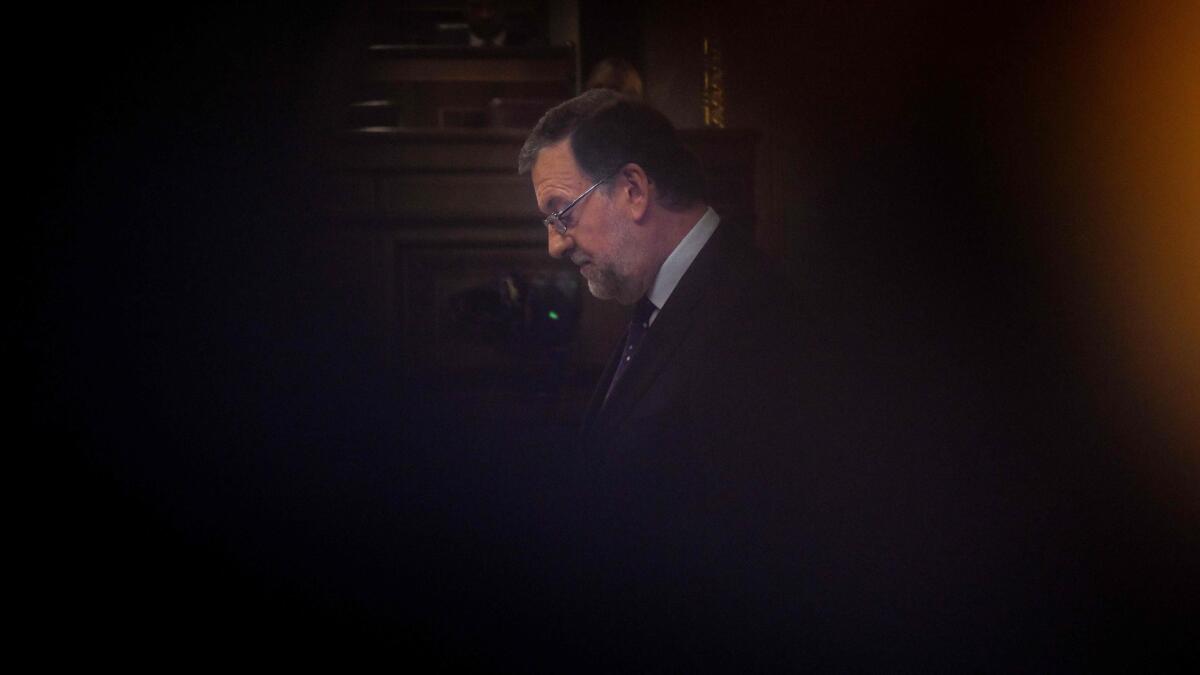Spain preparing to vote for third time in a year — with little hope of actually electing a government

Reporting from MADRID — As Americans cast ballots this fall, they might spare a thought for Spaniards preparing to do the same — for the third time in a year, with little hope of actually electing a government.
For nearly nine months, Spain has had only a caretaker, lame-duck government. Public infrastructure investment is on hold. Lawmakers have been unable to approve a new national budget. Some embassies are left with no ambassador.
It’s the longest Spain has gone without elected officials since it became a democracy in 1978, and it’s testing the country’s fortitude. (Belgium is believed to hold the world record for a democracy going without an elected government: 589 days in 2010-11.)
After a punishing economic crisis, two new national parties have emerged in Spain: Podemos, or We Can, on the left, and Ciudadanos, or Citizens, at the center-right. Both are led by fresh politicians in their 30s, challenging Spain’s 4-decade-old establishment of elites. The result? Absolute deadlock.
It’s like ‘Groundhog Day.’ We’re getting very good at voting, but our politicians are not as good at negotiating and forming governments.
— Gabriela Bustel, political columnist for Voz Populi
“Ever since the transition to democracy, Spanish politics were dominated by two large political parties on the right and left, which would alternate in power,” said Federico Santi, an analyst at the Eurasia Group, a political risk consultancy in London. “But now you have four, and you have to figure out complex coalitions. That takes time, especially in a country that’s never had to do it before.”
Two Spanish elections, in December and June, failed to yield a clear winner with a mandate to govern. The result was nearly identical: The conservative Popular Party won the most votes but fell far short of a majority and could not govern alone. Twice, its leader, incumbent acting Prime Minister Mariano Rajoy, was unable to woo enough parties into a coalition. e failed two confidence votes in parliament in the last two weeks.
“It’s like ‘Groundhog Day.’ We’re getting very good at voting, but our politicians are not as good at negotiating and forming governments,” said Gabriela Bustelo, a political columnist for Voz Populi, a Spanish online magazine. “It’s making people very upset, and columnists, well, we’re just going nuts.”
That was especially true when August vacations were disrupted by news that the date for a possible third election could fall on Dec. 25 — Christmas Day. It was the biggest end-of-summer letdown of all, said a group of otherwise merry college students, who scowled when a foreign reporter asked about Spanish politics.
“No one will vote. Everyone travels to visit family on Christmas. You thought turnout was low for the last election, just wait for this one!” exclaimed Mergelina Gomez, 21, sitting cross-legged in a circle of friends in Madrid’s Retiro park. “People are fed up. We voted twice, and they can’t reach a compromise — and now we might have to vote again? It’s ridiculous.”
In her family, Gomez said, only her grandparents would be able to vote on Christmas Day because they’re the only ones who remain in their voting district; the rest of the family travels to visit them.
Nationally, older Spaniards tend to be more conservative, so a Christmas election could benefit Rajoy.
Spain’s Constitution lays out a timeline for elections. After a failed confidence vote in parliament, lawmakers have 60 days to propose an alternative candidate for prime minister. Otherwise, the Spanish king dissolves parliament and calls fresh elections.
Because the debate over Rajoy’s candidacy began Aug. 31, members of parliament have until the end of October to back another candidate. Otherwise a new election will take place Dec. 25.
Many observers believe Rajoy scheduled his confidence debate with that election date in mind.
“Rajoy is playing this game. His strategy is to pressure the opposition Socialists with this bizarre election date,” Bustelo said, “so that the Socialist leader will be considered the culprit, the one to blame, for elections being held on Dec. 25 in this very Catholic country.”
But Rajoy’s opponents have called his bluff, refusing to endorse him. The center-right Ciudadanos agreed to a temporary alliance with the Popular Party, but it did not give Rajoy enough votes and has since expired.
One possibility could be for the Socialist leader, Pedro Sanchez, to propose a so-called coalition of losers, comprising all parties that placed behind the Popular Party in previous elections.
A similar Socialist-led coalition took power in neighboring Portugal last year. But in Spain, the electoral math would require rare alliances between smaller regional parties that disagree on a variety of issues, chief among them an independence drive by the northeastern region of Catalonia.
Spain’s king so far has delayed asking rival parties to negotiate yet again. It seems everyone knows the foregone conclusion: They’re unwilling to compromise.
“There’s real hatred between the right and left in Spain, and it goes back to the [1936-39] Spanish Civil War,” Bustelo said. “Instead of it getting better, it seems to get worse.”
Meanwhile, although no legislation has been passed in nearly a year, foreign tourist arrivals for the first half of 2016 were 11% higher than for all of last year. The unemployment rate has dipped below 20% for the first time in eight years, and the economy is growing by more than 3% a year — faster than most other countries in Europe.
All of this is proving to be fodder for Spanish satirists and cynics: This country may be better off, they say, if the politicians were to just stay home.
Frayer is a special correspondent.
ALSO
Clinton health incident at 9/11 commemoration caps a rough week and gives fuel to critics
U.S.-Russia deal on Syria will test influence of big powers, convictions of those on the ground
An ocean of threats must be tackled to protect the world’s ‘blue economy,’ U.S. undersecretary says
More to Read
Sign up for Essential California
The most important California stories and recommendations in your inbox every morning.
You may occasionally receive promotional content from the Los Angeles Times.










